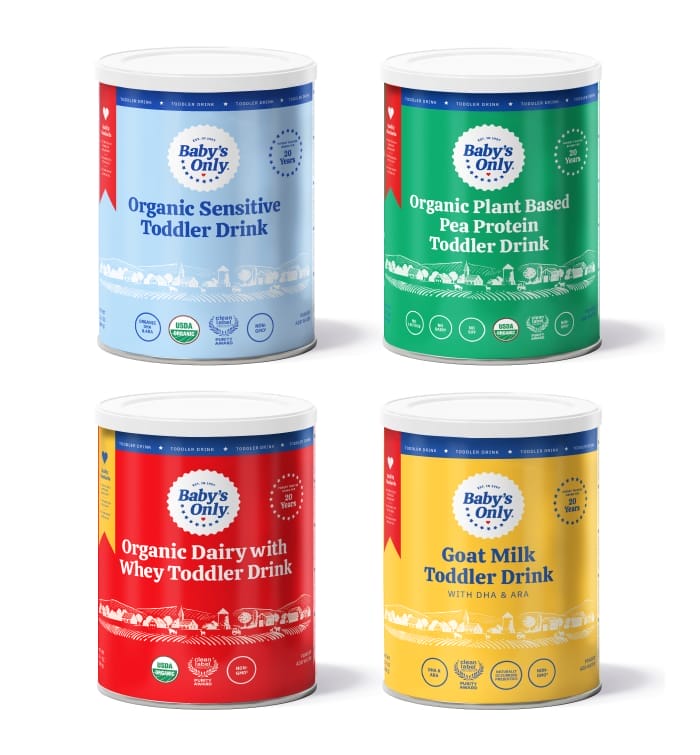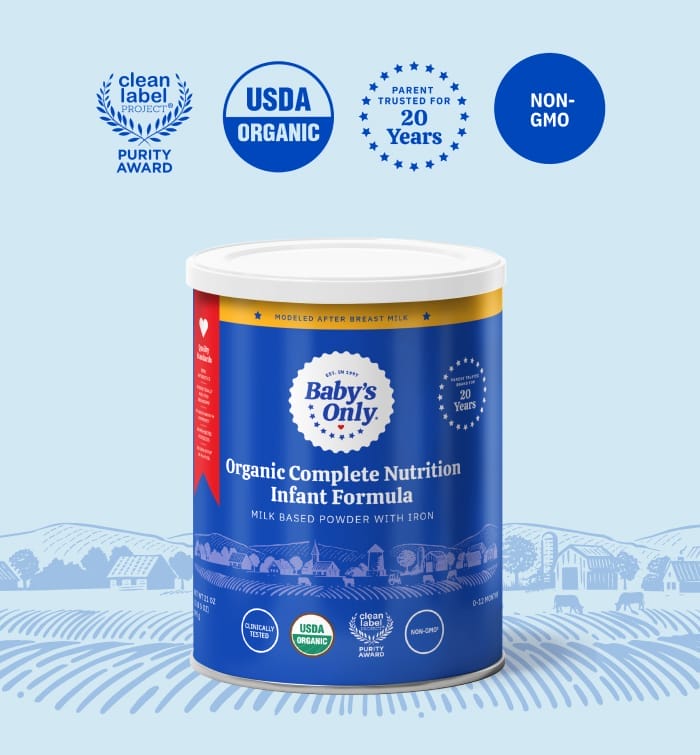We are proud to say that these posts are not sponsored. Our editorial team of Bobbie moms and writers personally select each featured product. If you buy something through our links, we may earn an affiliate commission, at no cost to you.
You’ve survived the first year of feeding your baby—congrats! The one-year milestone often marks the beginning of the transition away from infant formula or breastmilk. But figuring out how to feed your child can feel a bit daunting and toddler formula may look like a best next step. So what is toddler formula really, and what’s the difference between toddler formula vs regular milk?
- What is toddler formula?
- What is the difference between infant formula and toddler formula?
- Is toddler formula a replacement for baby formula?
- Differences between infant and toddler formulas include:
- Is there a difference between toddler formula vs. milk?
- What’s organic toddler formula?
- Are toddler formulas safe?
- What is the best toddler formula?
- Should you give your child toddler formula?

Shop Baby's Only Toddler Drink
The most affordable organic formula in the U.S. with cult favorite toddler drinks such as plant-based pea protein drink and a goat milk toddler drink.
What is toddler formula?
Toddler formula— sometimes also called toddler milk, growing-up milk, follow-up formula, or transitional formula (yes, there are that many different names for these products!) – is a powdered product intended for older infants and toddlers ages 12-36 months.
Around one year of age, toddlers are busy exploring solid foods— and hopefully, adding to the variety of what they eat. But feeding, like everything with toddlers, doesn’t always go as planned. Although it’s completely normal for toddlers to be inconsistent with eating, some parents may worry that their nutritional needs are not being met.
Toddler formulas are typically positioned as a way to help fill the gaps in a toddler’s diet, or to help round out nutritional intake during the transition from breastmilk or infant formula to drinking regular milk. Whether or not these products are necessary is explored below.
What is the difference between infant formula and toddler formula?
The main difference between infant formula and toddler formula is the concentration of nutrients.1 Infant formulas are designed to be the sole source of nutrition for babies up to 12 months of age. The FDA oversees the nutrient profile, ingredients, manufacture, and labeling of infant formula since it is the primary source of nutrition for many babies.2 In contrast, toddler formulas can have lower or higher amounts of many nutrients when compared to infant formula.3
Is toddler formula a replacement for baby formula?
There are no regulations for nutrient levels for toddler formulas, so it’s especially important not to substitute infant formula for toddler formula. Régine Brioché, MD, FAAP, Board certified pediatrician and Bobbie Medical Advisor explains, “Formulas labeled for toddlers contain a slightly different mix of ingredients and nutrients than infant formula. They typically contain more fat, sugar, calcium, phosphorus, iron, and sodium than is necessary for an infant.”
Further, there is considerable variety across toddler formulas— some may have higher levels of a nutrient compared to infant formula, but others may have lower levels. Also, some may include a nutrient known to play an important role in infant development, like choline, for example, and others may omit the same nutrient altogether.4
Differences between infant and toddler formulas include:
- Infant formulas are designed to be the sole source of nutrition, and therefore, to meet all of the nutrition needs for babies from birth through 12 months of age. Toddler formulas are intended to be used as a supplement to other sources of nutrition (such as solid food and cow’s or plant-based milk) for toddlers.
- Toddler formulas may or may not have nutrients known to be important during early development, such as DHA for development and choline. Because of the wide variability of nutrients in toddler formulas, parents should educate themselves on a specific toddler formula they may be considering and discuss any pros/cons with their pediatrician.
- Toddler formulas may have considerably higher levels of nutrients such as protein and sodium compared to infant formulas. A healthcare professional familiar with these products can help you decide if a toddler formula is safe and beneficial for your toddler.
According to US Dietary Guidelines 2020-2025, “Toddler milks or toddler formulas should not be fed to infants, as they are not designed to meet the nutritional needs of infants.”5

Shop Baby's Only Toddler Drink
The most affordable organic formula in the U.S. with cult favorite toddler drinks such as plant-based pea protein drink and a goat milk toddler drink.
Is there a difference between toddler formula vs. milk?
Toddler formulas and regular cow’s milk have considerable differences. Pasteurized cow’s milk is simply milk with the added fortification of vitamin D. Some of the naturally-occuring and important nutrients offered by dairy milk are protein, fat, calcium, and phosphorus, plus the vitamin D that’s added.6
The U.S. dietary guidelines suggest introducing about two cups of whole milk at age one – but no earlier because a baby’s digestive system isn’t quite ready before then.7
In contrast, toddler formula is made up of many ingredients that are combined to produce a product with protein, carbohydrates, fat, and many vitamins and minerals. Most toddler formulas offer iron, B vitamins, and zinc, which are nutrients not found in cow’s milk.
Most medical professionals and organizations— including the Academy of Nutrition and Dietetics (AND), the American Academy of Pediatric Dentistry (AAPD), the American Academy of Pediatrics (AAP), and the American Heart Association (AHA), recommend that infants transition from infant formula or breastmilk to whole cow’s milk or soy milk after their 1st birthday. Many recommend against toddler formulas, expressing concern about the use of corn syrup and other added sugars compared to the level of lactose found in whole milk. Even so, some parents prefer to use toddler formula instead of milk due to its convenience as a shelf-stable product, and for the benefit of its added nutrients.
What’s organic toddler formula?
Like infant formula, there are organic formulas and non-organic toddler formulas. Organic toddler formulas must meet the USDA organic standards, which means they can only contain certified organic ingredients. Non-organic toddler formulas are made with conventional ingredients sourced from food companies that use non-organic fertilizers or chemicals.
If you’re looking for an organic option, look for toddler formulas that list 100% organic on the package. If a product says made with organic ingredients, some of the ingredients will be organic, but others could be conventionally grown.
Is toddler transition formula necessary?
Whether or not your toddler actually needs a boost from a toddler formula should be discussed with your pediatrician. In general, most of the time, nutritional needs can be met through diet and regular milk (either cow’s milk or a nutritionally-appropriate plant-based milk8), but always discuss feeding and growth with your pediatrician.
Are toddler formulas safe?
Parents should know that toddler formulas are not designed to meet the nutritional needs of infants. They do not contain the right amount or combination of nutrients to be used as the sole source of nutrition for babies less than one year of age, and they should not be used as a substitute for breastfeeding or infant formula.
According to the CDC, “Babies younger than age 12 months should be fed infant formulas specifically designed to meet their nutritional needs. They should not be fed toddler milks, drinks, or formulas labeled for toddlers.”8
What is the best toddler formula?
“Most toddlers do not need toddler formula,” Dr. Brioché explains. “Through a combination of food and milk (or milk alternatives), a toddler will consume enough calories and nutrients to sustain proper growth.” If your pediatrician does recommend toddler formula, here are the best toddler formulas currently available.
- Baby’s Only Organic Dairy with Whey Toddler Drink. Baby’s Only has been the leading producer of organic toddler formulas for over 25 years. Their Organic Gentle toddler formula uses exclusively lactose as the carbohydrate source, contains added whey protein for easy digestion, and has received the Clean Label Project’s Purity Award!
- Baby’s Only Organic Plant Based Pea Protein Toddler Drink. A cult-like favorite, this dairy-free toddler formula is a great option for families with allergies or dietary restrictions. It is gluten free and does not contain any dairy or soy proteins and is the only powdered pea protein-based formula on the market.
- Enfagrow Toddler Formula. Enfamil makes a toddler formula called Enfagrow. It contains added nutrients like DHA, lutein, and vitamin E that the manufacturer says support healthy brain development.
- Gerber Good Start Stage 2 Formulas. Gerber makes several different formulas for toddlers, including a standard option and a soy option for infant not tolerating cow’s milk products.
- Else Plant-Based Complete Nutrition. This toddler formula is plant-based, but it includes almond butter and buckwheat for protein instead of soy.
- Similac Go & Grow. This product includes a prebiotic plus DHA, lutein, and vitamin E like many of the other options. Similac also offers a sensitive version of the product designed for toddlers who have difficulty digesting lactose.
- Kabrita Goat Milk Toddler Formula. Kabrita, made in the Netherlands, provides a formula option for people who prefer goat milk instead of cow milk. Goat milk may be easier for some toddlers to digest.
- Nutramigen Toddler Formula. Another product by Enfamil, Nutrmigen, is a hypoallergenic formula made for toddlers with food allergies. It also includes a probiotic the company says supports digestive health.
- Earth’s Best toddler formula. If you’re looking for an organic toddler formula, Earth’s best may be a good pick. It also includes DHA, ARA, and prebiotics.
Should you give your child toddler formula?
It’s always critical to discuss your nutrition and feeding concerns with your pediatrician. As you transition away from the infant stage and towards the toddler stage, expect that many unpredictable changes are ahead! Review your child’s eating patterns, growth trends, and any unique nutrition needs with their doctor.

Shop Baby's Only Organic Formula
Baby's Only makes affordable organic infant formula in the Heartland of the US. Beloved by parents, it's available at most retailers nationwide and is the most affordable organic formula in the U.S.
Sources:
- Toddler Drinks, Formulas and Milks | National Library of Medicine
- Code of Federal Regulations Title 21 | FDA
- Nutrition & Marketing | RUDD Center
- Choline, an Essential Nutrient | National Library of Medicine
- Dietary Guidelines for Americans | DietaryGuidelines.gov
- Milk 101 Nutrition Facts and Effects | Healthline
- Cow’s Milk and Milk Alternatives | CDC
- Choosing an Infant Formula | CDC

